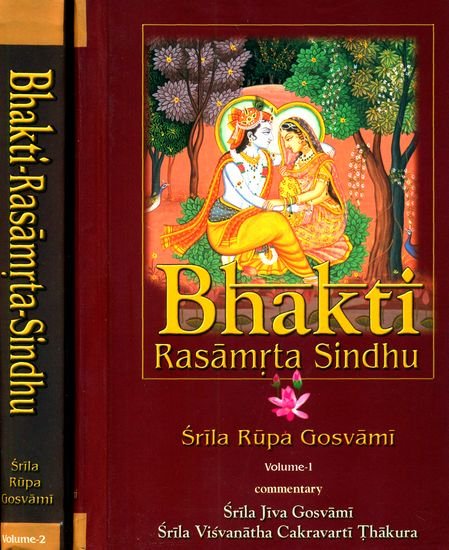Bhakti-rasamrta-sindhu
by Śrīla Rūpa Gosvāmī | 180,912 words
The English translation of the Sri Bhakti-rasamrta-sindhu verse 2.1.13; a medieval era Sanskrit book, written by Rupa Goswami (fl. 15th century) which represents a devotional (bhakti) masterpiece. In this work Goswami describes the nature and different forms of pure love (rasa) as well as various other topics on Vaishnavism and devotion.
Verse 2.1.13
Sanskrit text, Unicode transliteration and English translation:
विभाव अन्द् थे ओथेर् इन्ग्रेदिएन्त्स्, qउइच्क्ल्य् बेचोमेस् fउल्ल्य् तस्तेfउल्.”
अत्र विभावादि-सामान्य-लक्षणम् —
ये कृष्ण-भक्त-मुरली-नादाद्या हेतवो रतेः ।
कार्य-भूताः स्मिताद्याश् च तथाष्टौ स्तब्धतादयः ॥२.१.१२॥
निर्वेदाद्याः सहायाश् च ते ज्ञेया रस-भावने ।
विभावा अनुभावाश् च सात्त्विका व्यभिचारिणः ॥२.१.१३॥vibhāva and the other ingredients, quickly becomes fully tasteful.”
atra vibhāvādi-sāmānya-lakṣaṇam —
ye kṛṣṇa-bhakta-muralī-nādādyā hetavo rateḥ |
kārya-bhūtāḥ smitādyāś ca tathāṣṭau stabdhatādayaḥ ||2.1.12||
nirvedādyāḥ sahāyāś ca te jñeyā rasa-bhāvane |
vibhāvā anubhāvāś ca sāttvikā vyabhicāriṇaḥ ||2.1.13||
English translation
“The general characteristics of the ingredients are as follows: In tasting rasa, the causes of rati such as Kṛṣṇa, His devotee, and the sound of the flute are called vibhāvas. The effects of rati, such as smiling are called anubhāvas and the eight symptoms, such as being stunned are called sāttvika-bhavas. The assistants such as self-criticism are called vyabhicārī-bhāvas.”
